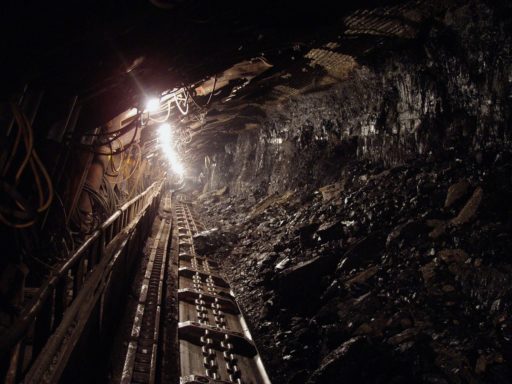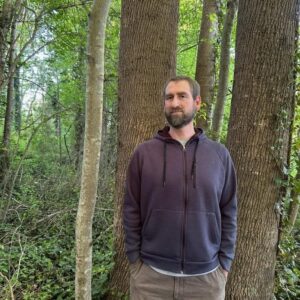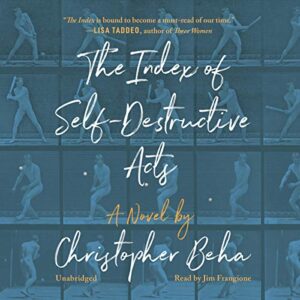A local DJ is spinning polkas on the radio. It’s Sunday morning. His name is Johnny Kotrick, and the radio station is WNCC in Barnesboro, Pennsylvania. This place is called Coal Country because its very life depends on the black mineral. The pocket of small towns here exists because of coal, and in the mid-1970s, it thrives because of coal. On Sunday morning, the sons and daughters of European immigrants are, for the most part, tuned in on AM radios—radios in kitchens and cars, and radios in social clubs like The Polish Legion and the Slovak Club. The bars at the social clubs are packed after second Mass. It might be a safe bet: most of the drinkers are miners, sons of miners, or retired miners.
On any given Sunday, Johnny Kotrick will put you on the radio. All you have to do is dial 948-8255. Between polkas you make your request right on the air. “Hello, Johnny. This is Leo Stanek, and I’d like you to play a nice polka for my son Gerry, whose birthday is on December 30th. Play him a snappy one, Johnny. Maybe something by Eddie Blazonczyk.” Then there’s some chatter between Leo and Johnny, and Johnny makes a big deal of my birthday. I’m a teenager, and it’s a little embarrassing. I mean, I’m happy for my dad’s effort, but I’m too young to appreciate the gravity of polkas on the radio; I’m too young to recognize this fleeting moment as a touchstone within a unique culture. I’m too young to know that touchstones like this will not last forever, or that cultures will disappear.
I never considered the likelihood of an author understanding that place. It wasn’t that writers hadn’t tried. But books about Coal Country didn’t capture my coal country. So, when I set out to earn an MFA in the summer of 2016, my intentions lay in finding the words to describe it. I see northern Cambria County from a distance now, at any rate: I’ve lived in North Carolina since 2014, and the Coal Country I knew doesn’t exist. It disappeared when the last mine closed in 1986.
The supervisor for my second MFA semester was a writer named Charlie Baxter, and Charlie suggested that I get a book by Alistair MacLeod called The Lost Salt Gift of Blood. I’d never heard of MacLeod, but it didn’t take long to see why I needed to read the book.
In a story called “The Vastness of the Dark,” set in MacLeod’s native Nova Scotia, the first-person narrator recalls his father’s clothes, packed for a rescue of trapped miners: “The permanently blackened underwear, the heavy woolen socks, the boots with the steel-reinforced toes, the blackened, sweat-stained miner’s belt which sagged on the side that carried his lamp, the crescent wrench, the dried and dustied water-bag…the hard hat chipped and dented and broken by the years of falling rock.”
MacLeod writes about boots, belts, and hardhats with the assumption that we can picture them; or that if we cannot, we don’t need to. We can surmise what a miner’s belt looks like, guess that the lamp a miner carries is dirty and industrial, understand that the coal dust has permeated the underwear so that it will never be clean, never be free of the coal. We might also see that a metaphor lies in the permanently blackened underwear, and in the story’s title. MacLeod, after all, wants to illuminate humanity, not the things miners wear or carry.
“In the Fall,” the story that opens MacLeod’s 1976 collection, features a horse rescued by the narrator’s father—a horse brought out of the mine so that it might not go blind. In “The Vastness of the Dark,” Macleod finds it necessary to explain the horses—there are lots of blind horses—because the animals supply another metaphor that’s too strong to resist: “…all of them were blind. They had been so long in the darkness of the mine that their eyes did not know the light, and the darkness of the labour had become that of their lives.”
The mine and its effect on people hover over the entire book. MacLeod’s narrator talks about his grandfather: “I can hear him coughing and wheezing from the rock dust on his lungs. And perhaps that coughing means that because he has worked in bad mines with bad air these last few years he will not live so very much longer.” In Western Pennsylvania it’s called black lung—respiratory problems brought on by coal dust.
MacLeod’s book touched me when I found it because I knew the characters. The Lost Salt Gift of Blood captured something universal about work and life in an isolated place. The book reminded me of Charlie Baxter’s exhortation that situation is not story. Underwear and hacking coughs and backbreaking work are just situations. The way MacLeod’s narrator and characters react to these situations is at the heart of his work. Their reactions are the real story.
When I contemplate a radio program in the 1970s, I’m forced to think about it in terms that lie outside of the situation. What does the Sunday Sound of Polka Music mean? Or why should it be meaningful to someone who never heard it, someone who doesn’t know Coal Country? Mostly, the polka show created a mood that rose above the drudgery of work—that rose above the vastness of the dark. Like all great art—like poetry from Frost, or a Hopper painting, or a Beethoven concerto—the Sunday Sound of Polka Music had the power to evoke memory and emotion.
The show’s tentacles were far-reaching, part of an alloy that included the kitchen smells of various European states, the several Catholic churches that dotted the ridges, and a perpetual connection to the coal. When I found MacLeod’s book, I wondered at how impossible it must be for a reader to know that place, and how it might be equally difficult to make someone see and feel my place. But therein lies the beauty of literature: MacLeod presents the coast of Nova Scotia in ways that are deeply human. A reader only requires a heart to understand his characters.
In our car, the polkas are on before and after Mass. My dad might light a cigar on the way home. We’re dressed in our Sunday best. I hate dressing up for church. Really, I hate dressing up for anything. I prefer jeans and a flannel shirt. And I can’t yet grasp the larger reasons behind Sunday best. I can’t imagine that all of Sunday’s activities, including my Sicilian mom’s spaghetti—we have it every Sunday—are a pronouncement about things that are profound and, somehow, permanent. Some things are larger than hoot owl shift and coal dust, and like poetry, or a painting, or a symphony, their meaning can’t be easily articulated.
Even if something is inexpressible, you recognize it when you see it. You know it’s there, even if you can’t describe it. And because it’s been put down in a poem or a painting, or in a Sunday radio program, you also recognize that it is permanent. Really, it can’t disappear. No one can take it away from you.
Gerry Stanek has written three books set in the coal fields of Western Pennsylvania. He publishes Notes from Plattsville semi-regularly via Substack and recently released an album of rock and roll songs that’s streaming everywhere. He lives in Greensboro, NC with his three daughters. Find him athttps://gerrystanek.com/





